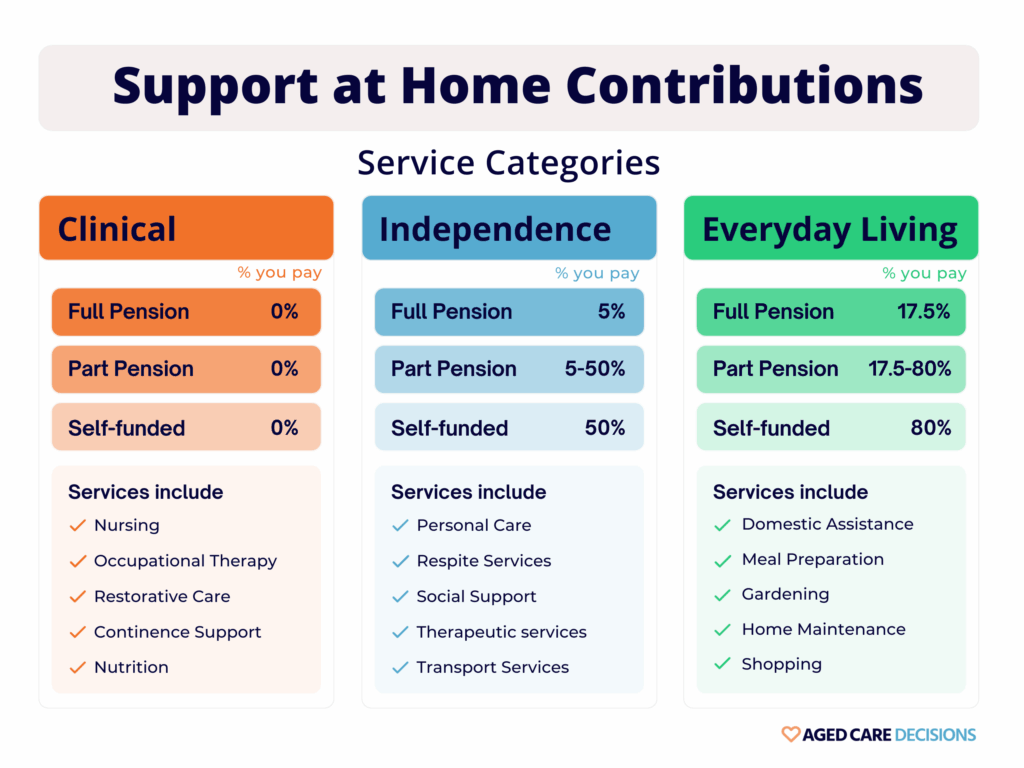By launching Support at Home, the government intends to overhaul and improve the delivery of in-home services for seniors. Let’s look at whether you will be better off when Support at Home replaces Home Care Packages and the Short-term Restorative Care Program on 1 November 2025.

Why is home care changing?
Support at Home was developed in response to The Royal Commission into Aged Care Quality and Safety, which identified many opportunities to improve the delivery of aged care services in Australia.
The new system aims to:
Provide more individualised, flexible support for more people.
- Improve access to services, equipment, and home modifications.
- Reduce waiting times (with a goal of a maximum 3 months wait by June 2027)
- Deliver a simpler, more equitable home care system for seniors.
So, what changes should you expect, and will you be better off?
Capped administration fees
Currently, Home Care Package providers can charge up to 35% of a client’s package budget in fees. Under Support at Home, provider administration fees will be capped at 10% to ensure that more funding goes directly to care services—not to overheads.
Let’s look at how Jane will be better off with the cap on provider fees, along with her ability to rollover $1,000 or 10% of her quarterly budget (whichever is greater):
|
Home Care Package |
Support at Home |
|
Jane has a Level 2 Home Care Package. Each week, she receives one hour of personal care and one hour of domestic assistance, both charged at $75 per hour, totalling $150 per week. Her quarterly budget of $4,655.49 is used to cover:
(2hrs week × $75hr × 12 weeks)
|
Jane will be a transitioned grandfathered Level 2 Home Care Package customer. Each week she will receive one hour of personal care and one hour of domestic help, both charged at $100 per hour, totalling $200 per week.
(2hrs week × $100hr × 12 weeks)
|
Increased transparency and control over budgets and services
Under Support at Home, providers will be required to publish simple, standardised pricing for services.
They will also have to deliver a clear monthly breakdown of how each recipient’s budget is planned and spent, including what funds they have, how much has been spent, and on what.
You will be able to access these details online, meaning you’ll be able to monitor your care and budget in real time.
With clearer pricing and more detailed reporting, it will be easier to determine whether your home care provider is delivering the level of care you’re entitled to.
Changing home care providers will remain easy and free.
This is where Aged Care Decisions can assist.
Our custom software can take your care needs, location, budget, and personal preferences and match you with available home care providers in your area. We can then send you a tailored options report that you can use to compare different home care providers quickly and easily.
Fully funded clinical care for all
Under Support at Home the government will fund 100% of the cost of clinical care for all recipients.
This means nobody on Support at Home will pay out-of-pocket costs for:
- nursing care
- occupational therapy and other allied health services
- restorative care
- continence support
- nutrition support.
A user pays system for independence and daily living supports.
Most Support at Home recipients will pay some out-of-pocket costs for everyday living and independence support services, which can include:
Personal care services, like showering and hygiene
- Housework and gardening
- Transport
- Meal delivery services
- Social supports
Your out-of-pocket costs will depend on which services you receive, as well as your assets and income. For example:
- A full pensioner will pay 5% for independence supports and 17.5% for daily living services.
- A part pensioner will between 5%-50% for independence supports and between 17.5-80% for everyday living services.
- A self-funded retiree will pay 50% for independence supports and 80% for everyday living services.
If you are a self-funded retiree on a lower income (and you’re eligible for a Commonwealth Seniors Health Card) you will pay a similar contribution to a part pensioner.
Read more: Understanding contributions for the new Support at Home Program

The “no worse off” principle for current Home Care Package recipients
If you currently have a Home Care Package, or were assessed for one before September 2024, your income-tested fee will not increase when you transition to the Support at Home system.
If you don’t pay an income-tested fee now, you won’t pay one under Support at Home.
Read more: What will happen to your Home Care Package on 1 November
Possible disruptions during transition
It’s normal to feel anxious and unsure about change. If you are concerned about your level and quality of care being affected by the transition to Support at Home, Aged Care Decisions can help.
We regularly share the most up-to-date home care news and information with our families. We can help you to understand exactly how home care is changing and how the changes will affect you.
We assist tens of thousands of families to navigate the Australian aged care system, and secure quality home care providers that perfectly suit their needs.
Our home care support service is 100% free, independent and obligation free.
Read more about Support at Home: https://www.health.gov.au/our-work/support-at-home







